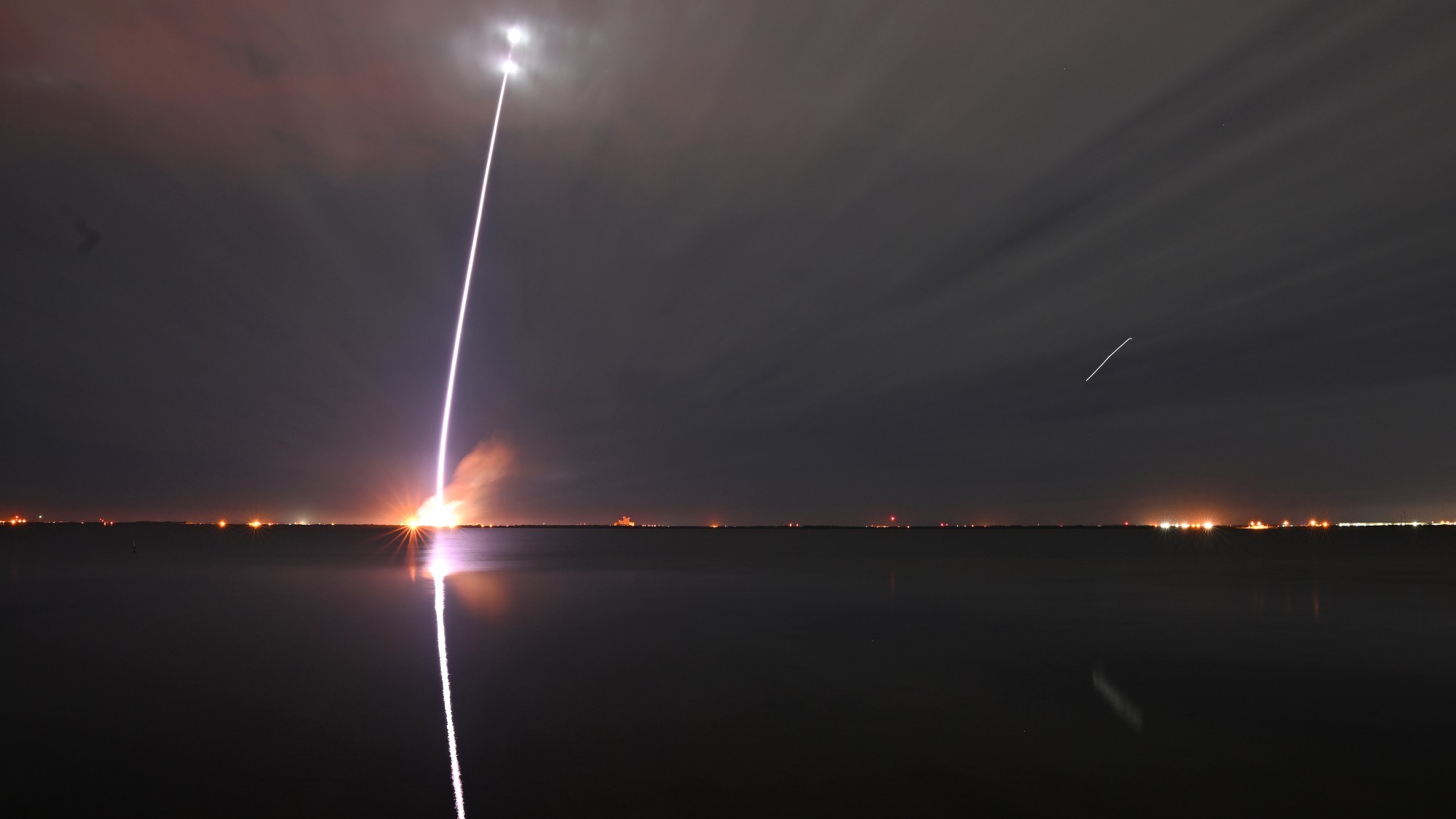Jeff Bezos, Elon Musk and the billionaire space race
Tesla CEO and Amazon founder vie for dominance of satellite launch market and could influence Nasa plans to return to Moon

A free daily email with the biggest news stories of the day – and the best features from TheWeek.com
You are now subscribed
Your newsletter sign-up was successful
Two of the world's richest and most powerful men have launched two of the world's largest rockets this week in an escalation of their corporate space race.
Tesla and X boss Elon Musk and Jeff Bezos, the founder of Amazon, are gunning for top dog status in the commercial space business with their respective companies SpaceX and Blue Origin.
This week SpaceX launched Falcon 9, the world's most active rocket, carrying more of its Starlink internet satellites as well as Moon landers for Nasa. Musk's company is also conducting its seventh test flight of its new Starship megarocket, scheduled to lift off from Texas tonight.
The Week
Escape your echo chamber. Get the facts behind the news, plus analysis from multiple perspectives.

Sign up for The Week's Free Newsletters
From our morning news briefing to a weekly Good News Newsletter, get the best of The Week delivered directly to your inbox.
From our morning news briefing to a weekly Good News Newsletter, get the best of The Week delivered directly to your inbox.
Today Blue Origin also launched its New Glenn rocket from Florida on an inaugural mission into space, the first step into Earth's orbit for Bezos's company as it aims to take on the – until now – dominant SpaceX.
What is SpaceX?
Musk founded Space Exploration Technologies Corporation – known as SpaceX – in 2002, in the hope of "making affordable spaceflight a reality", said Britannica. SpaceX was the first private company to launch a rocket into Earth's orbit, doing so in 2008. It then won a Nasa contract worth more than $1 billion to develop a successor to the space shuttle.
SpaceX also runs Starlink, a satellite internet service that provides broadband access to remote areas. It is now developing Starship, the world's largest and most powerful rocket. It hopes to send humans and cargo to the Moon, and launch settlers to Mars.
What is Blue Origin?
Bezos founded Blue Origin 25 years ago, saying he wanted "millions of people working and living in space". For years, the company has been launching a small reusable rocket called New Shepard to take passengers to the edge of the Earth's atmosphere, including Bezos himself – famously wearing a cowboy hat. But the company has never sent anything into orbit, until now.
A free daily email with the biggest news stories of the day – and the best features from TheWeek.com
In the future, New Glenn will launch Blue Origin's Moon lander for Nasa.
So who's winning?
SpaceX, by a light year. It has until now "dramatically outperformed" Blue Origin, said the BBC, launching rockets 134 times last year. But today's launch will be seen as a "major step forward" for Blue Origin.
New Glenn is about "twice as powerful" as SpaceX's Falcon 9, said Sky News. It's also far larger and can accommodate "bigger batches of satellites". That said, SpaceX's Starship "would be more powerful still".
Musk could leverage his enormous influence over the incoming Trump administration to "undercut" Blue Origin, said Reuters. He has the president-elect's "ear on space matters". But Bezos has some leverage. Amazon has donated $1 million to Trump's inauguration fund and will stream the event. New Glenn is expected to "chip away at SpaceX's market dominance" and "kickstart" Blue Origin's emergence in the satellite launch business.
What about the future of space exploration?
Experts believe a successful New Glenn launch will "create real competition between the two companies", said the BBC, and could "drive down the costs" of space exploration. Nasa is "increasingly moving away" from relying on public money and government funding, and has issued "huge contracts" worth billions to private companies, most notably SpaceX.
The growing power of both companies could therefore affect Nasa's plans to send crewed missions back to the Moon. Last month Musk said the US should head for Mars before returning to the Moon – "fuelling concerns of a major shakeup" to Nasa's programme, said Metro. Trump has also repeatedly fixated on Mars during rallies. But Bezos is clear that he believes the US should do both.
They also aren't the only "massively rich billionaires" in the space race: don't forget Richard Branson's Virgin Galactic. The skies "could be getting crowded".
Harriet Marsden is a senior staff writer and podcast panellist for The Week, covering world news and writing the weekly Global Digest newsletter. Before joining the site in 2023, she was a freelance journalist for seven years, working for The Guardian, The Times and The Independent among others, and regularly appearing on radio shows. In 2021, she was awarded the “journalist-at-large” fellowship by the Local Trust charity, and spent a year travelling independently to some of England’s most deprived areas to write about community activism. She has a master’s in international journalism from City University, and has also worked in Bolivia, Colombia and Spain.
-
 Political cartoons for February 15
Political cartoons for February 15Cartoons Sunday's political cartoons include political ventriloquism, Europe in the middle, and more
-
 The broken water companies failing England and Wales
The broken water companies failing England and WalesExplainer With rising bills, deteriorating river health and a lack of investment, regulators face an uphill battle to stabilise the industry
-
 A thrilling foodie city in northern Japan
A thrilling foodie city in northern JapanThe Week Recommends The food scene here is ‘unspoilt’ and ‘fun’
-
 Are AI bots conspiring against us?
Are AI bots conspiring against us?Talking Point Moltbook, the AI social network where humans are banned, may be the tip of the iceberg
-
 Elon Musk’s pivot from Mars to the moon
Elon Musk’s pivot from Mars to the moonIn the Spotlight SpaceX shifts focus with IPO approaching
-
 Can Europe regain its digital sovereignty?
Can Europe regain its digital sovereignty?Today’s Big Question EU is trying to reduce reliance on US Big Tech and cloud computing in face of hostile Donald Trump, but lack of comparable alternatives remains a worry
-
 Moltbook: the AI social media platform with no humans allowed
Moltbook: the AI social media platform with no humans allowedThe Explainer From ‘gripes’ about human programmers to creating new religions, the new AI-only network could bring us closer to the point of ‘singularity’
-
 Will regulators put a stop to Grok’s deepfake porn images of real people?
Will regulators put a stop to Grok’s deepfake porn images of real people?Today’s Big Question Users command AI chatbot to undress pictures of women and children
-
 Is social media over?
Is social media over?Today’s Big Question We may look back on 2025 as the moment social media jumped the shark
-
 Data centers could soon be orbiting in space
Data centers could soon be orbiting in spaceUnder the radar The AI revolution is going cosmic
-
 Inside a Black community’s fight against Elon Musk’s supercomputer
Inside a Black community’s fight against Elon Musk’s supercomputerUnder the radar Pollution from Colossal looms over a small Southern town, potentially exacerbating health concerns